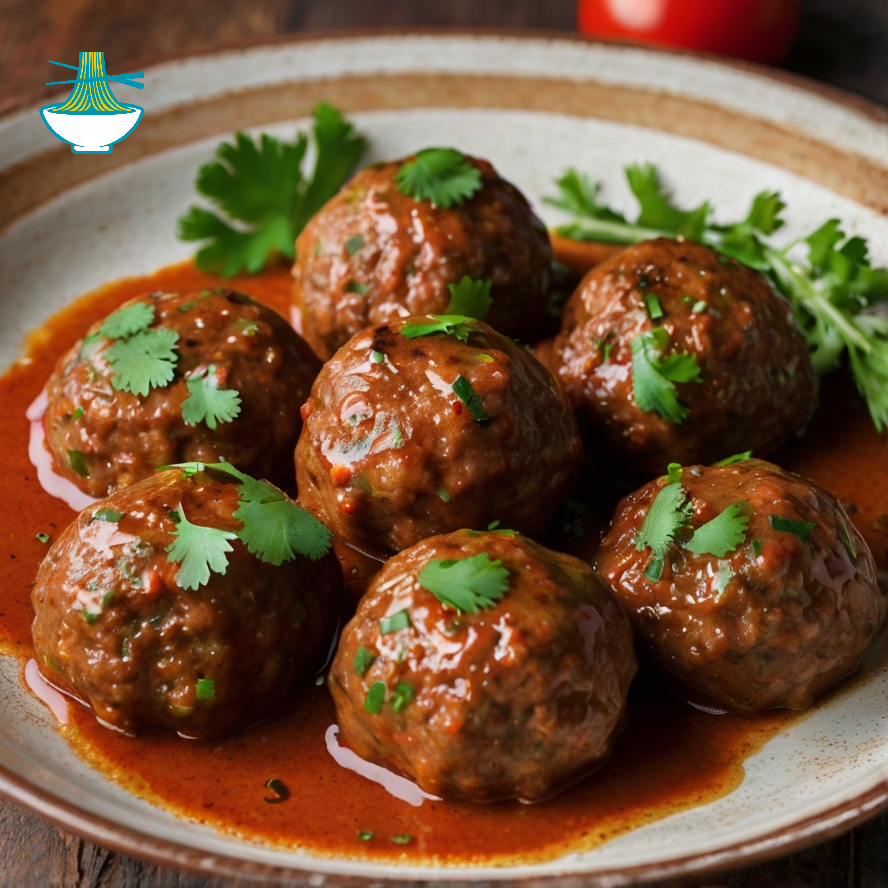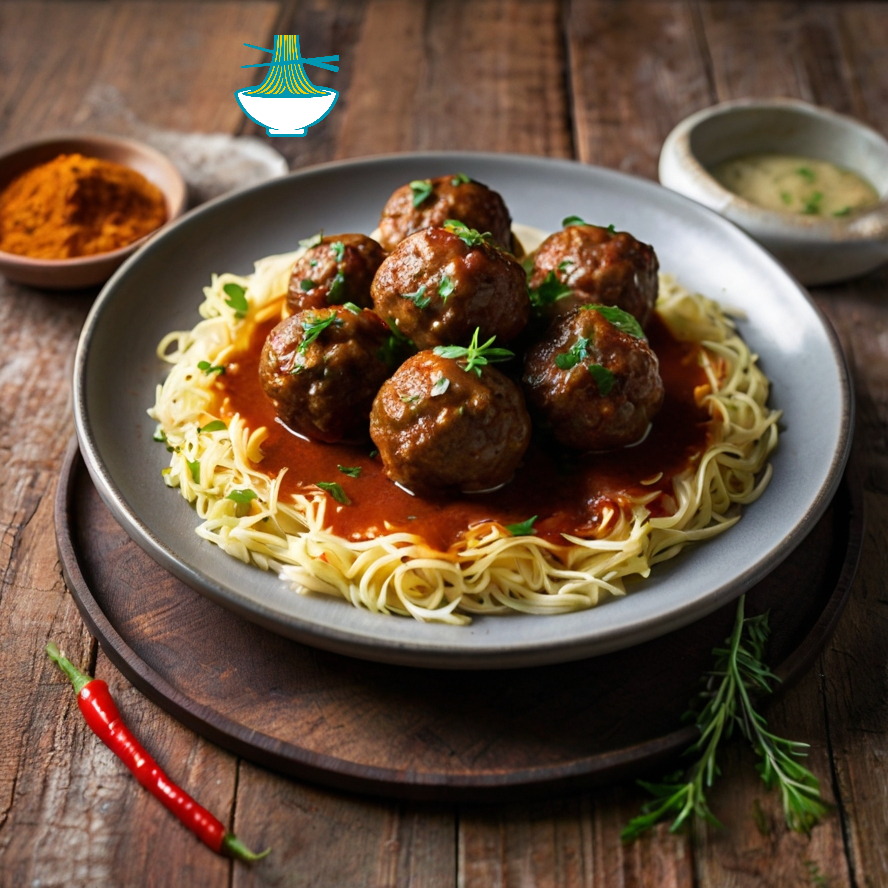Kofta is a beloved dish in many Middle Eastern and North African cuisines, featuring spiced meatballs that are either grilled or fried to perfection. This dish offers an excellent combination of protein and healthy fats, making it a filling meal that is also packed with essential vitamins and minerals. The spices used in Kofta not only enhance its flavor but also provide numerous health benefits. Rich in iron, vitamin B12, and zinc, the meat used in Kofta supports the immune system, promotes muscle growth, and helps with energy production. When paired with fresh vegetables and a side of rice or bread, Kofta becomes a well-rounded, nutrient-dense meal. However, it’s important to consume Kofta in moderation, especially when fried, as it may increase calorie and fat intake.
Ingredients:
- 500g ground beef or lamb
- 1 small onion, finely chopped
- 2 cloves garlic, minced
- 1 teaspoon ground cumin
- 1 teaspoon ground coriander
- 1 teaspoon paprika
- 1/2 teaspoon ground cinnamon
- Salt and pepper to taste
- Fresh parsley, finely chopped (optional)
- 1 egg (optional, for binding)
- 2 tablespoons olive oil (for frying or grilling)
Preparation Steps:
Prepare the Ingredients:
- In a large mixing bowl, add 1 pound (450g) of ground meat (such as beef, lamb, or chicken).
- Finely chop 1 medium onion and mince 3 cloves of garlic, then add them to the bowl.
- Add 1 tablespoon of ground cumin, 1 tablespoon of ground coriander, 1 teaspoon of paprika, and 1/2 teaspoon of ground cinnamon for a rich, spiced flavor.
- Season with salt and pepper to taste, typically around 1 teaspoon of salt and 1/2 teaspoon of pepper.
- Optionally, add 1 beaten egg and 1/4 cup of fresh chopped parsley if you like extra flavor and moisture in the mix.
Mix the Ingredients:
- Using your hands or a spoon, mix all the ingredients thoroughly until everything is evenly combined. Ensure that the spices, onion, garlic, and parsley are distributed well throughout the meat.
Shape the Kofta:
- Take a small portion of the mixture (about 1 to 2 tablespoons) and roll it between your hands to form small, round meatballs. Alternatively, shape them into oval-shaped patties for a traditional kofta presentation.
- If you prefer, you can also form them into longer sausage shapes, depending on your preference.
Cooking the Kofta:
- Frying Method: Heat 2 tablespoons of olive oil in a frying pan over medium heat. Once hot, add the kofta meatballs to the pan. Cook for about 8-10 minutes, turning occasionally, so they cook evenly on all sides. You want them to develop a nice golden-brown crust while remaining juicy inside.
- Grilling Method: Preheat your grill or grill pan to medium-high heat. Place the kofta on the grill and cook for 6-8 minutes per side, flipping them carefully to ensure they are cooked through and browned evenly.
Serve the Kofta:
- Once cooked, remove the kofta from the pan or grill and let them rest for a minute or two to retain their juices.
- Serve the kofta hot with a side of fluffy rice, warm flatbread, or a fresh salad. You can also pair it with a yogurt-based sauce or a tangy tomato sauce for extra flavor.
Enjoy your delicious, homemade Kofta!
Tips and Variations from Expert Chefs:
- Spice Variations: Kofta recipes are flexible when it comes to spices. You can adjust the seasoning to suit different tastes or regional preferences. For example, adding chili flakes, cumin, or saffron can make the dish spicier or give it a more distinct flavor.
- Personalizing Kofta: If you’re looking for a twist, try incorporating unique spices from other cuisines like turmeric for a golden color, or garam masala for an Indian-inspired Kofta. Experimenting with different herbs, such as cilantro or dill, can also give the dish a fresh, aromatic profile.
Commonly Asked Questions:
1. Can Kofta be prepared in a healthier way?
- Yes, there are healthier methods to prepare Kofta. One option is to grill or bake the meatballs rather than frying them. Grilling allows excess fat to drip away, reducing the calorie content of the dish. Additionally, using lean meats like turkey or chicken instead of beef or lamb can lower the fat content while maintaining the protein levels.
2. Can the meat in Kofta be replaced?
- Yes, you can replace the meat in Kofta with plant-based alternatives. For instance, you can use ground vegetables, legumes like lentils, or plant-based meats available in the market. Vegan Kofta is gaining popularity, and ingredients like chickpeas, tofu, and quinoa work well to create a similar texture and flavor.
3. How should Kofta be stored after preparation?
- Once cooked, Kofta can be stored in an airtight container in the refrigerator for up to 3-4 days. If you prefer to prepare it in advance, you can store uncooked Kofta in the refrigerator for up to 24 hours before cooking. Make sure to wrap the meatballs tightly to maintain their flavor and texture.
4. Can Kofta be frozen?
- Yes, Kofta can be frozen both before and after cooking. To freeze uncooked Kofta, place the meatballs or patties on a baking sheet and freeze them individually. Once frozen, transfer them to a freezer bag for up to 3 months. To freeze cooked Kofta, simply let it cool to room temperature, then store it in a freezer bag or container. When you’re ready to eat, thaw and reheat it thoroughly.
5. How can Kofta be served in innovative ways?
- Kofta is versatile and can be served in many creative ways. Consider serving it with a variety of dips and sauces such as tahini, yogurt-based sauces, or spicy harissa. Kofta can also be paired with roasted vegetables, pickles, or served in pita bread with a fresh salad for a Mediterranean-inspired sandwich. Adding a squeeze of lemon juice or a sprinkle of fresh herbs like mint or parsley can elevate the dish.

Nutritional Values and Benefits
500g Ground Beef or Lamb
- Calories: 1000-1200
- Protein: 80g
- Fat: 80g
Nutritional Benefit: Ground beef or lamb provides a significant source of high-quality protein, which is crucial for muscle repair and growth. It is also rich in zinc and vitamin B12, which support immune function and energy metabolism. However, since red meat can be high in saturated fat, it is advisable to consume it in moderation for heart health.
1 Small Onion (about 70g)
- Calories: 28
- Carbohydrates: 6g
- Fiber: 1g
Nutritional Benefit: Onions are an excellent source of antioxidants and vitamin C, which support the immune system and improve skin health. The fiber in onions promotes digestion and gut health, while the sulfur compounds may help regulate blood sugar levels.
2 Cloves Garlic (about 6g)
- Calories: 9
- Carbohydrates: 2g
Nutritional Benefit: Garlic is known for its antibacterial, anti-inflammatory, and immune-boosting properties. It can help lower blood pressure and cholesterol levels, supporting overall heart health. Additionally, garlic's antioxidants help fight oxidative stress.
1 Teaspoon Ground Cumin
- Calories: 8
- Carbohydrates: 1g
Nutritional Benefit: Cumin is rich in iron and antioxidants, promoting digestion and boosting the immune system. It can also support healthy blood sugar levels and improve appetite regulation.
1 Teaspoon Ground Coriander
- Calories: 5
- Carbohydrates: 1g
Nutritional Benefit: Coriander is a good source of dietary fiber, vitamin C, and vitamin K. It has anti-inflammatory and antibacterial properties and may aid in lowering blood sugar levels and improving digestion.
1 Teaspoon Paprika
- Calories: 6
- Carbohydrates: 1g
Nutritional Benefit: Paprika is high in vitamin A, which supports eye health and immune function. It also contains capsaicin, which may promote fat burning and have pain-relieving properties.
1/2 Teaspoon Ground Cinnamon
- Calories: 3
- Carbohydrates: 1g
Nutritional Benefit: Cinnamon is rich in antioxidants and has anti-inflammatory properties. It has been shown to help lower blood sugar levels and improve insulin sensitivity.
Fresh Parsley
- Calories: Negligible
Nutritional Benefit: Parsley is high in vitamins A, C, and K, which support skin health, immune function, and bone health. It also contains antioxidants that help reduce oxidative stress.
1 Egg
- Calories: 70
- Protein: 6g
- Fat: 5g
Nutritional Benefit: Eggs are an excellent source of protein and essential nutrients such as vitamin B12, vitamin D, and choline. They support muscle health, cognitive function, and the nervous system.
2 Tablespoons Olive Oil
- Calories: 240
- Fat: 28g
Nutritional Benefit: Olive oil is a source of heart-healthy monounsaturated fats, which help lower bad cholesterol levels. It also has anti-inflammatory properties and provides antioxidants like vitamin E.
Nutritional Focus:
Kofta is a protein-packed dish, offering significant health benefits through its combination of spiced meat and various healthy ingredients. It contains essential nutrients like vitamin B12, iron, and zinc from the meat, as well as fiber and antioxidants from vegetables and herbs. However, the nutritional value varies depending on the preparation method.
For those following a low-fat or low-carb diet, Kofta can still fit in as part of the plan if prepared carefully:
- Low-Fat Diet: Choose lean meats like turkey or chicken and bake or grill the Kofta instead of frying it. Avoid high-fat sauces or accompaniments.
- Low-Carb Diet: Pair the Kofta with low-carb sides like grilled vegetables or a leafy salad instead of bread or rice.
Important Tip: While Kofta is rich in nutrients, it is important to consume it in moderation, especially for individuals with health conditions like high blood pressure or elevated cholesterol levels. The red meat and the oil used in frying can contribute to higher levels of saturated fats, so it’s wise to balance your meals accordingly.
Nutritional Summary:
Kofta is a rich and protein-packed dish, thanks to the combination of spiced meat and various healthy ingredients. The spices used in Kofta, such as cumin, coriander, and paprika, not only enhance the flavor but also contribute to the dish’s anti-inflammatory and digestion-boosting properties. The meat provides essential proteins, iron, and vitamin B12, while the olive oil adds healthy fats that support cardiovascular health. The inclusion of garlic, onion, and fresh parsley further enhances the dish's antioxidant content, supporting overall immune function and well-being.


Comments